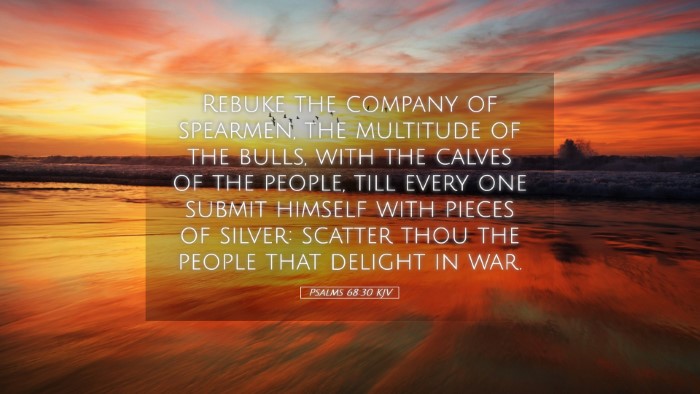Psalms 68:30 - Commentary and Insights
Verse Text: "Rebuke the company of spearmen, the multitude of the bulls, with the calves of the people: till every one submit himself with pieces of silver: scatter thou the people that delight in war."
Introduction
This verse is a compelling summons for divine intervention against groups that oppose God’s people. It weaves imagery of strength and conflict, illustrating both the opposition faced by the faithful and the ultimate sovereignty of God over nations and individuals.
Commentary Overview
Several prominent public domain commentaries offer deep insights into the various facets of this verse. Matthew Henry, Albert Barnes, and Adam Clarke provide expound various interpretations and applications relevant to students, pastors, and theologians.
Matthew Henry's Commentary
General Themes: Henry emphasizes the duality of God's power as both a protector of His people and a rebuker of their enemies. The verse provides a vivid picture of God's might displayed against those who threaten His chosen ones.
- “The company of spearmen” – Represents those who come against God's people with military might.
- “The multitude of the bulls” – Symbolizes the strength and ferocity of enemies akin to powerful beasts.
- “Calves of the people” – Suggests the vulnerability of God’s people compared to their adversaries, yet it indicates their value in God's sight.
Henry points out that the Israelites, while seemingly outmatched, are encouraged to seek divine assistance. The verse ultimately reveals the futility of opposing God’s will and the assurance of victory for those who rely on Him.
Albert Barnes' Commentary
Military Imagery and Divine Sovereignty: Barnes interprets the military imagery as an expression of the turbulence and conflicts that God’s people inevitably encounter. His insights delve into the essence of the phrase, “till every one submit himself with pieces of silver,” suggesting a call for humility and recognition of God's authority.
- Submission Required – Barnes clarifies that submission is vital in the face of God’s power. He mentions that the peace of God can only be experienced through a willing surrender to His lordship.
- The Silver Pieces – He reflects upon the symbolism of silver, which traditionally represents redemption and atonement. Barnes posits that the mention of money may suggest a need for offering—recognizing that everything belongs to God.
Barnes' remarks reinforce the dual nature of God's justice: for the defiant, His rebuke is severe, yet for the submissive, it leads to peace and favor.
Adam Clarke's Commentary
Context and Interpretation: Clarke offers a detailed contextual backdrop, noting the historical significance of conflict in Israel’s narrative. He reflects on God’s might against nations and how those who oppose Him are warned of His impending judgment.
- “Scatter thou the people that delight in war” – Clarke interprets this as a cry for divine intervention against those who thrive on warfare and destruction. It emphasizes God’s ability to disrupt and dissipate those who oppose His covenant people.
- Address to Believers – He also addresses the faithful, encouraging them that they need not fear their adversaries as God holds ultimate authority over nations.
Clarke concludes with a poignant reminder that while conflict may arise, God's faithful love ensures that those aligned with Him will prevail. His analysis encourages believers to remain steadfast and hopeful amidst turbulence.
Theological Implications
Across these commentaries, several theological themes emerge:
- God's Sovereignty: Each commentator affirms God's control over all affairs, reminding readers that human opposition will not thwart divine purposes.
- Call to Submit: The necessity of submission to God is a central theme, echoing throughout the text as an essential attribute of faith.
- The Importance of Prayer: The request for divine help highlights the role of prayer in spiritual warfare, necessitating a reliance on God amidst challenges.
Applications for Believers
For contemporary believers, these insights can foster a deeper understanding of God's role in trials and conflicts. The call to submit comes with a promise of deliverance, reminding the faithful of the importance of humility and dependence on God.
- Encouragement in Warfare: Just as the Israelites faced tangible enemies, believers today are reminded to engage in spiritual battles with the confidence that God defends His own.
- Faith in Despair: The imagery of God rebuking powerful adversaries speaks to those in situations that seem overwhelming, providing hope that God fights for the oppressed.
- Reflections on Peace: Believers are encouraged to reflect on their own submission to Christ and how that translates into a life marked by peace in a chaotic world.
Conclusion
Psalms 68:30 encapsulates the struggle between the forces of evil and the power of God. Through the insights of Matthew Henry, Albert Barnes, and Adam Clarke, we see the beauty of scriptural truth that beckons believers to recognize their position under God’s authority. This call to submission is both a challenge and a comfort, assuring the faithful that, despite opposition, God’s plan prevails. In an era where conflict seems pervasive, these teachings impel believers to focus their trust in God's unwavering sovereignty.


